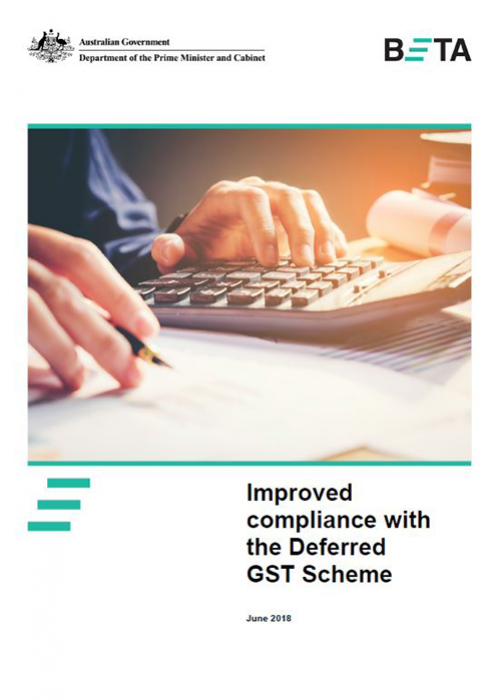BETA partnered with the Australian Tax Office to design and test behaviourally informed methods of communications aimed at improving compliance among businesses in the Deferred GST Scheme.
We ran two separate randomised controlled trials to test the effectiveness of emails.
The first trial evaluated the impact of sending a ‘cooperative’ and a ‘direct’ toned reminder email to existing businesses who were found to be non-compliant with the Scheme. Both emails improved compliance rates.
The second trial tested the effectiveness of sending a welcome email to new businesses who had just registered for the Scheme. The email contained a planning prompt recommending businesses set up a monthly calendar reminder about their DGST obligations. This intervention did not improve compliance.
Pre-registration information
The Deferred GST scheme allows businesses to defer the payment of GST on taxable imports to help manage their cash flow position. In order to remain on the scheme businesses must continue to meet all of their tax obligations. This includes lodging a monthly activity statement and being up to date on any payments due to the ATO.
At any given time, a proportion of businesses on the scheme are non‑compliant. Addressing this non-compliance creates additional work for the ATO and leads to higher levels of outstanding tax debt.
This trial will test a new behaviourally-informed method of communication aimed at helping businesses remain up to date with their tax. The intervention will target new businesses signing onto the scheme as well as businesses that are already non-compliant. A successful intervention would increase business compliance and bring forward business tax payments.
ADDITIONAL TRIAL INFORMATION
Intervention start and end date: Thursday, 27 April 2017 to Friday, 01 September 2017
BETA ethics pre-registration number: BETA ETH 2017 - 008
Experimental design:
Non-Compliant Businesses: This will be a ‘three‑arm trial’ involving two treatment groups and a control group. Businesses will first be matched into triplets exhibiting similar characteristics. Randomisation will then be applied to each triplet so that one business is assigned to each of the treatment groups and one is assigned to the control group.
New Businesses: This will be a ‘two-arm trial’ involving one treatment and a control group. Businesses will be allocated to the treatment or control group using simple randomisation.
Intervention(s):
Non-Compliant Businesses: Businesses in the treatment groups will receive an email reminding them to fulfil their tax obligations and highlighting the penalties of continued non-compliance. These interventions seek to exploit behavioural insights in relation to loss aversion and the potency of deadlines.
New Businesses: In addition to the standard welcome letter, businesses in the treatment group will also receive a welcome email using simplification, salience and planning prompts.
Control condition:
Non-Compliant Businesses: No email
New Businesses: Standard welcome letter (no email)
Outcome(s):
Primary Outcomes: Compliance with the DGST Scheme, Payments to the ATO.
Secondary Outcomes: Client account balances, interaction with (phone calls to) the ATO.
Expected sample size:
Non-compliant businesses: At least 1,200 businesses
New Businesses: At least 300 businesses
Other:
Hiscox, Michael. 2017. Making it less taxing: Using email reminders to improve tax compliance amongst businesses. AEA RCT Registry. May 09.
Hiscox, Michael. 2017. Making it less taxing: Using planning prompts to improve tax compliance amongst businesses. AEA RCT Registry. May 09.


